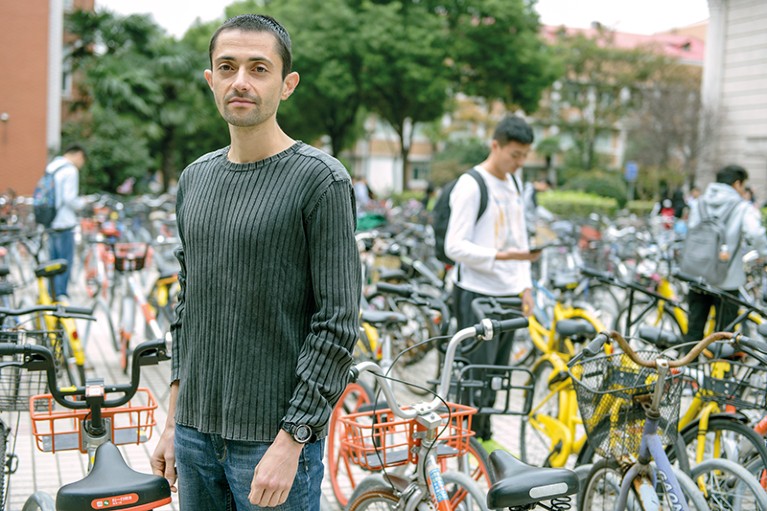
Cosimo Bambi.Credit: Daniele Mattioli
Although Fudan University — one of China’s most prestigious — has its campuses in the heart of the country’s most populous city, Cosimo Bambi says that Yangpu District in Shanghai feels more like a small town. “You can live there and not worry about many other things — several students live inside the campus, they don’t have to leave,” he adds.
Since moving to China, the 36-year-old professor has completed 63 research papers, covering gravity, cosmology and high-energy astrophysics. He has been at Fudan since 2012, having won a place there through China’s Thousand Young Talents Plan, which is part of the wider Thousand Talents recruitment scheme launched by the Chinese government in 2008 to encourage highly skilled people — especially scientists — to work in the country.
Bambi has already stayed far longer than his programme’s three-year minimum requirement, and his contract is now considered for renewal every three years; a process he describes as a formality. He says the Chinese government’s keenness to recruit foreign talent has helped to create a working environment in which he feels he can achieve far more than he would in Europe or the United States. “I might be just a researcher working with one postdoc or young research student,” he says of the United States. “Here I have several students and my teaching load is low: only one course per year. In Europe and North America you have to teach a few more classes.”
He decided to move after speaking to Chinese colleagues at the University of Tokyo, who lauded their country’s heavy focus on research. He hasn’t looked back since. “It’s completely different,” he says. “For a foreigner, it’s impossible to find a permanent position in Japan due to the country’s relatively closed scientific culture. But in China, I don’t feel like there is any difference in terms of opportunities.”
Bambi’s research team usually comprises around one to four postdoctoral researchers, as well as four or five PhD students and a large number of undergraduates. He says that the team works well, and that the challenges of managing it are very different to those he would face working in the United States or Europe.
“Typically Chinese students are hard-working, but having a good academic record is often completely uncorrelated with their research skills,” he says. He adds that the Chinese education system can foster students who work very hard, but do not always show great initiative in their work.
Students are also required to take additional classes outside their core subject, he says. “A student of mine had to attend ceramics, sports and biology classes. All very interesting subjects, but probably better to be attended at high school, and not useful to physics.”
Yet Bambi adds that his students are, on the whole, highly motivated in comparison with those he met in Europe. “In Italy, students are more relaxed. The admission process feels less competitive. Students tend to go to the university in their home town. And there’s an expectation people are also there to have fun. Whereas at Fudan, students have gained top marks in a gruelling university entrance exam and, often, the weight of their family’s expectations is upon them.”
Language is a problem. He started learning Mandarin after moving to China, but gave up after a few months, realizing that to speak the language with any degree of competency would take a huge amount of work. Instead, while at work, Bambi is helped by his secretary. The rest of the time he relies on translation apps such as Google Translate. He pays his bills with the Chinese mobile app Alipay, and uses the messaging app WeChat to stay in touch with friends. Both have English versions.
“I lead a very simple life,” he admits. “I live very close to campus, and eat in the canteen. My friends and family don’t tend to visit as it’s too far for them.”
Bambi has travelled extensively in China, often combining a work trip with sightseeing. He particularly likes the southern cities that are surrounded by lush mountains, which offer a stark contrast to the flat, concrete cityscape of Shanghai. “The coastal city of Shenzhen, for example, is very lush, and surrounded by forested hills,” he says.
At present, Bambi has no plans to leave China. His final decision, he says, will come down to balancing professional opportunities against concerns about poorer air quality and a far less generous welfare system than in Europe.
“For my salary, for my research, for my work, it is a good place,” he says. “But there are many things to take into account,” he says. “Who knows? Maybe I’ll stay forever.”
Additional reporting by Sarah O’Meara.


 China’s plan to recruit talented researchers
China’s plan to recruit talented researchers
 Returning to a revitalized China after research abroad
Returning to a revitalized China after research abroad





